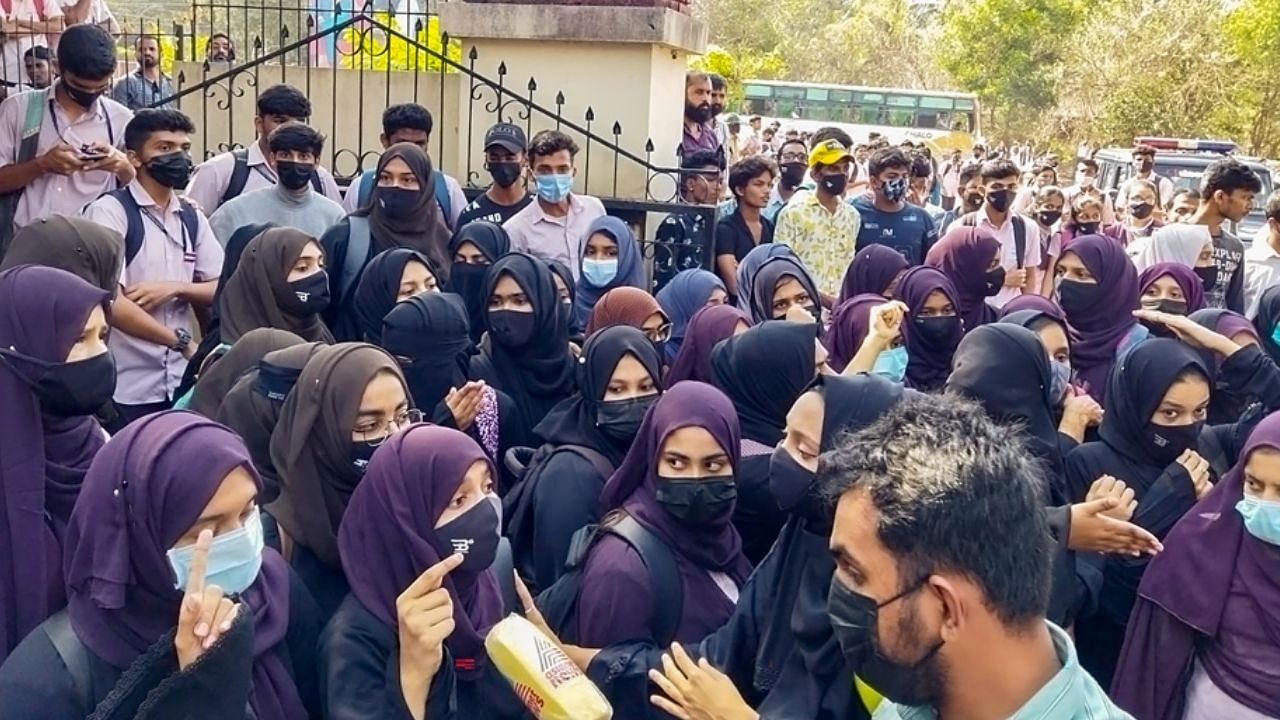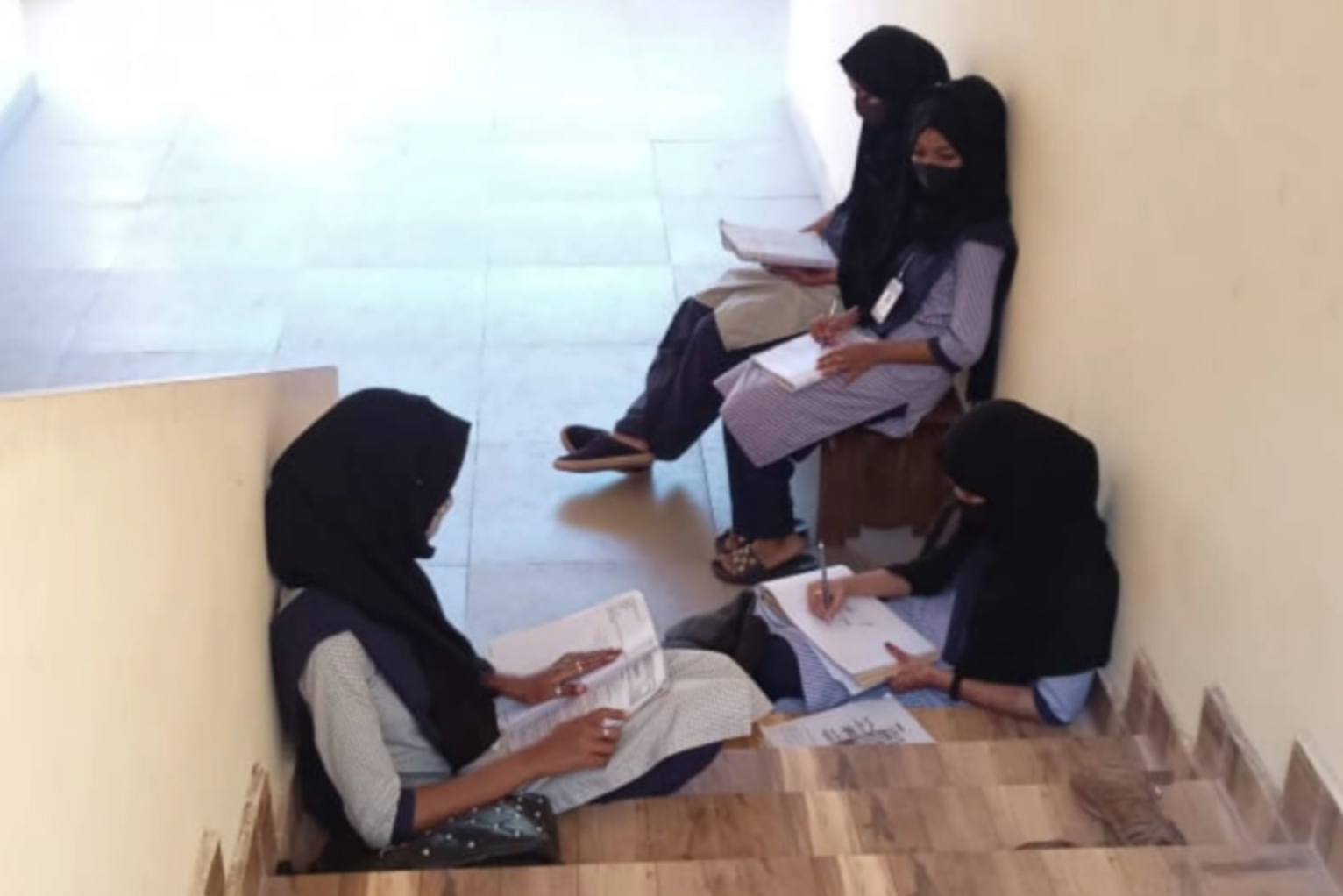Outrage grows as anti-Hijab row escalates in Karnataka

The ban has sparked fears of further marginalization among the Muslim community of Karnataka who constitute around 12 percent of the state’s population.
Muhammad Raafi | TwoCircles.net
KARNATAKA — Aliya Mehar was crestfallen when the teachers at her school in Shivamogga district in Karnataka asked her to remove her Hijab before entering the school. Mehar, (16), a student of Karnataka Public School had to appear in her Class 10 exams on Monday. She couldn’t appear as she was forced to return home.
“I was depressed with what I had just experienced,” Mehar told TwoCircles.net. She said she would prefer Hijab over her exams.
On Wednesday, protests erupted at some places in the state as college girls refused to remove their Hijab. The girl students also marched on the streets demanding that they be allowed to wear Hijab.
https://twitter.com/KeypadGuerilla/status/1493860975287894019?s=20&t=4xBQ3a1JxO2qaQLoBLYlNA
Over the last two months the controversy around the Hijab, in at least three government-run institutions of Karnataka has left Muslim students disheartened after several Hindu students started demanding that the Hijab should not be allowed in the schools. The controversy started in late December after a teacher at PU College in the Udupi district refused entry of Hijab wearing students inside a classroom.
The picture of the girls sitting on the stairs of the PU College went viral on social networking sites triggering a backlash.
[caption id="attachment_445068" align="aligncenter" width="1532"] Photo of the girls sitting on the stairs of the college. | Picture: Al Jazeera[/caption]
Photo of the girls sitting on the stairs of the college. | Picture: Al Jazeera[/caption]
The Muslim students said the ban on hijab violates their religious freedom guaranteed under the constitution of India. The US ambassador-at-large for International Religious Freedom on Friday said the hijab ban would stigmatize and marginalize women and girls.
Mehar’s father Ibrahim told TwoCircles.net that the ban on Hijab in schools and colleges is tantamount to attacks on Muslim symbols and practices and is part of the Hindu far-right agenda of imposing majoritarian values on minorities.
“The Muslim students were never subjected to this humiliation ever in Karnataka,” he said. The Bharatiya Janata Party (BJP), which rules the state has backed the discriminatory ban.
Ibrahim said that he would rather prefer to send his daughter to a private school.
On Tuesday, Muslim girl students and teachers wearing hijab were barred from entering schools and colleges across the south Indian state. The pictures and videos of Muslim women being forced to remove hijab outside their schools created an outcry with social media users calling it “humiliation”.
https://twitter.com/KeypadGuerilla/status/1493097774887276547?s=20&t=bJW7pQ07oGzIK6mlsBrzlw
Meenakshi Ganguly, South Asia director of the Human Rights Watch tweeted the “ban on Hijab violates international law obligations to uphold the right to express religious beliefs and the right to education without discrimination.”
Meanwhile, in Karnataka Public School Meher and her Muslim classmates who were wearing Hijab, were bundled into a classroom. The students were told that they cannot appear in their exams. “The teachers said if we don’t remove our hijab we will miss our exams.”
The students responded by saying that they will not compromise on the Hijab.
Former Chief Minister and leader of the opposition, Siddaramaiah, termed the ban on Hijab as inhuman which is aimed at denying education to Muslim girls.
On Tuesday, the opposition delegation met chief minister Basavraj Bomai demanding that the students should be allowed to attend their educational institutions.
Kaneez Fatima, a Congress lawmaker who was part of the delegation, told TwoCircles.net that the chief minister told them that they will have to abide by the court ruling.
Fatima said that she was apprehensive that the issue will spill over to other spheres of life if it was not resolved soon. She was, however, hopeful that the court will rule in the favour of Muslim girls.
The ban has sparked fears of further marginalization among the Muslim community who constitute around 12 percent of the state’s population.
Saddam, a father of two daughters, aged 3 and 4, said that if the Hijab ban is upheld by the court he would prefer sending his daughters to a Madrassa. “Hijab is essential to the tenets of Islam and hence uncompromisable.”
The Hijab issue is pending with the Karnataka High Court where hearings are underway. Last week, the court issued an interim order banning religious clothing including Hijab inside the classrooms. Days later, there were many instances of Muslim girls and women, including teachers being forced to remove their Hijab outside schools and colleges.
It has triggered outrage among the community with many saying that the court directions are restricted to classrooms only.
When TwoCircles.net asked the Vice Principal of Karnataka Public School in Shivamooga district, Susheela, why the court rulings were being violated. She said, “I am following the direction of the Education department.”
Speaking with the TwoCircles.net, the spokesperson of the ruling Bharatiya Janata Party (BJP), Ganesh Karnik termed the Hijab row a conspiracy and said that “the government has no role in deciding the uniform in institutions and it is up to the college management.”
Muhammad Raafi is a journalist based in New Delhi. He tweets at @mohammadraafi
